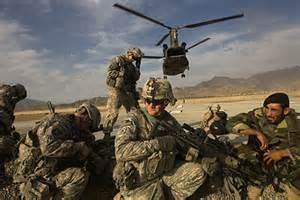
Stars and Stripes: Facing stalled negotiations with Afghanistan’s president over a long-running war that’s swiftly falling from public view, U.S. officials have again signaled that President Barack Obama is mulling a complete U.S. pullout from the country.
In recent months, the United States and Afghanistan have been trying to hash out a plan to maintain an unspecified number of U.S. and allied troops in Afghanistan for training and counterterrorism missions after the official end of combat operations in 2014. But now, The New York Times reported Tuesday, Obama is “giving serious consideration” to a complete withdrawal because of problems working with Afghan President Hamid Karzai.
The mercurial Karzai’s outbursts have frequently complicated the two nations’ dealings over the years, but the situation came to a head last month. Karzai, angered by U.S. attempts to hold peace talks with the Taliban in Qatar, broke off negotiations over a long-term U.S.-Afghan security agreement.
The current flare-up is not the first time the administration has discussed the so-called “zero option.” In January, prior to a Karzai visit to Washington, White House deputy national security adviser Ben Rhodes told reporters that leaving no troops in Afghanistan was one of options under consideration.
But now, officials are saying that a full withdrawal, as the U.S. carried out in Iraq in late 2011, is becoming more likely. “There’s always been a zero option, but it was not seen as the main option,” the Times quoted an unnamed senior Western official in Kabul as saying. “It is now becoming one of them, and if you listen to some people in Washington, it is maybe now being seen as a realistic path.”
About 63,000 U.S. troops remain in Afghanistan, down from a peak of more than 100,000 in 2010. That number is set to drop to 34,000 by February, and continue to decline after Afghan national elections next April.
There are major differences of opinion within the Obama administration that make it hard to tell if the zero option is a real possibility or a negotiating tactic, said Anthony Cordesman, a national security analyst for the Center for Strategic and International Studies.
“Are you messaging this to try and get (Afghan officials) to move forward with some more effective approach?” he said. “Or is it because you really believe it?”
The troop count is not the only issue, Cordesman said. Post-war commitments of military and civilian aid are also hanging in the balance. With the stakes so high, the threat of a total withdrawal and accompanying cuts in international aid could be healthy motivation for Afghan officials, he said.
“I think it is very helpful for them to signal to the Afghans that the United States will shape its commitment to Afghanistan in direct proportion to the progress the Afghans make” on a range of fronts, he said.
But Lisa Curtis, the senior research fellow at Heritage Foundation, a conservative think tank in Washington, said an actual complete pullout would hamper the global counterterror mission and be a “disaster for U.S. interests.”
And even talking about it is not helpful as a negotiating tactic, because, she said, “The Afghans are already skeptical of the U.S. commitment to the region.”
But the head of a left-leaning veterans group, VoteVets.org, said U.S. servicemembers have done their job in Afghanistan, and it is time to bring them home.
“Ultimately, whether their nation survives is up to them, and keeping our troops there doesn’t change that equation,” said Jon Soltz, an Iraq war veteran and the organization’s chairman. “The only thing that changes, day by day, is the number of American men and women we’ve lost.”
I’m not holding my breath that Obama will do a complete withdrawal as you can’t count on what he says.
But the time has come to exit, IMO. Our troops have been there way too long – they should have gone in, completed the mission, and exited. Course I’m bias as my soldier is serving over there. They were rocketed on the Fourth of July and during the past two evenings.
Bring them home now!
DCG

